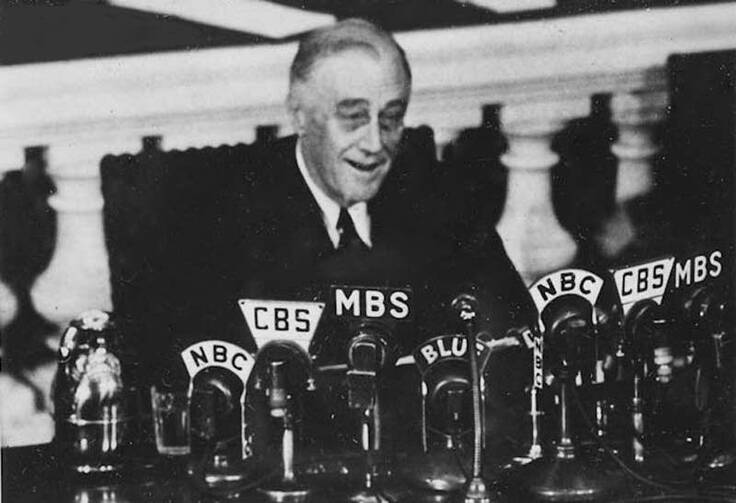A Homily for the Fourth Sunday of Easter
Readings: Acts 4:8-12 1 John 3:1-2 John 10:11-18
On March 1, 1945, Franklin Delano Roosevelt delivered his last address to Congress. He had just returned from Yalta, the last of his “Big Three” military conferences. Very few people knew that the president was suffering from congestive heart failure, but on this day, everyone could see that he was exhausted. Six weeks later, in Warm Springs, Ga., Roosevelt would die from a cerebral hemorrhage.
This first day of March, F.D.R. did something he had never done before. He allowed himself to be rolled in his wheelchair into the joint session of Congress. He had never appeared in public as a crippled man.
Paralyzed from the waist down by polio in 1921, F.D.R. had made his triumphant return to politics at the 1924 Democratic convention when he appeared to stride to the podium to deliver the nominating speech for presidential hopeful Al Smith. He did so by mastering a feigned walk, wearing a combination of heavy braces and holding himself with a strong, supportive arm.
For the next 21 years, most Americans would not see evidence of F.D.R.’s disability. Neither his wheelchair nor photos of it ever appeared in public.
The president began his last speech to the assembled Congress with a request and a long-denied explanation.
I hope that you will pardon me for this unusual posture of sitting down during the presentation of what I want to say, but I know that you will realize that it makes it a lot easier for me not to have to carry about ten pounds of steel around on the bottom of my legs; and also because of the fact that I have just completed a fourteen-thousand-mile trip.
We can argue whether the man makes the moment or the converse, but no one can deny that America profoundly changed under Franklin Delano Roosevelt. Before he came to office, the federal government was rivaled in size by those of the states. When World War II began, the United States Army ranked 17th in size and power, just behind Romania. Having already won a fourth term in office, the architect of all that had changed finally felt free to be himself. The United States could admit that it had a crippled president, and at long last so could he.
St. John wrote:
Beloved, we are God’s children now;
what we shall be has not yet been revealed.
We do know that when it is revealed we shall be like him,
for we shall see him as he is (1 Jn 3:2).
Our faith teaches that we, like the risen savior, shall someday be radically transformed, glorified. There are two affirmations here: All will be different, but we will remain who we are.
Left unanswered is the nature of the transformation. Will it occur within the reach of science? Be empirically verifiable? We cannot say. We will change as Christ did, but his transformation was not studied by science. His glorification took him beyond the reach of empiricism.
The better question is this: Which will metamorphose more profoundly, the physical or the spiritual?
Try to imagine a world in which each of us steps free from sin, leaves behind its narrowness, its constant need for concealment, and its ever-limiting drain upon our vital energies. Even without a physical transformation, would we not look very different, quite changed? Would not our world as well?
Franklin Roosevelt felt that he had to end the Great Depression and win a world war before he could fully reveal himself to the American people, trust their willingness to accept him as he was. How different will everything be, at the close of history, when such openness comes not through our exhausting efforts but by the grace of God?
In the summer of 1944, F.D.R. made his last trip to the Pacific theater of war. He privately visited a naval hospital at Pearl Harbor, one filled with amputated servicemen. The president wheeled himself from bed to bed. He wanted these men to know that they should continue to hope, their worlds were not at an end. He selflessly thought that seeing a crippled commander-in-chief might help.
At that point, F.D.R. was still quite like us. To appear vulnerable, to set aside secrecy, was to run a risk. He was willing to do that to help others. Eight exhausting months later, nature or grace having triumphed—doubtlessly both—F.D.R. could finally be himself. For the rest of us, the question is still open.
Having said that what we are to be is yet to be revealed, St. John adds:
Everyone who has this hope based on him makes himself pure, as he is pure (1 Jn 3:3).
What will it take for us to be purely ourselves, without the delusion and deception of sin? Will it be a triumph of an ever-youthful grace or an exhausted nature? That is up to us.








